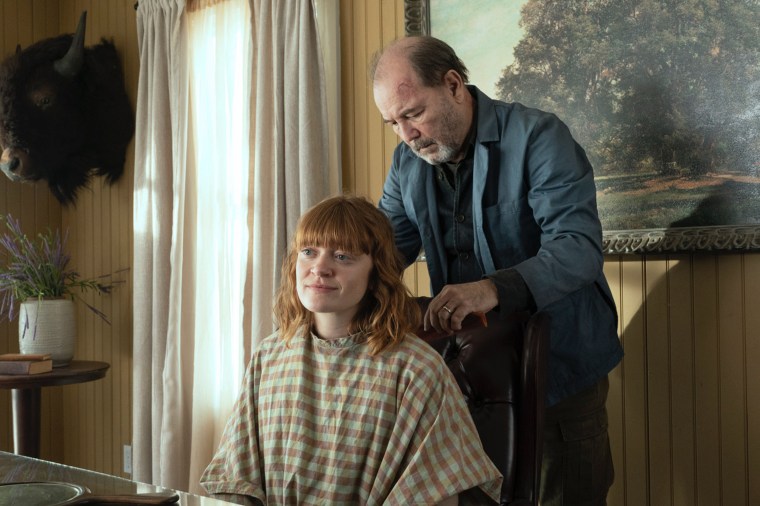When fans tune into the much anticipated season six premiere of “Fear the Walking Dead” on Sunday, they will be apprehensive about losing a beloved character, and watching others break out into uncertain futures. But for Latin music icon Rubén Blades, who is reprising his star role as Daniel Salazar, the TV show delivers a very compelling message that resonates deeply with his family: an ending can be a new beginning.
“One of the interesting things about ‘The Walking Dead’ universe and ‘Fear the Walking Dead’ is that the new reality destroyed the usual controls and stereotypes about power and who holds it,” Blades told NBC News. “In the new scenario, what matters is your character, how strong you are, and how you can contribute to prevent death, yours and that of others.”
As an example, he pointed out that women in “Fear the Walking Dead” are strong or stronger then men. And similarly, off camera, the musician-actor describes his mom and his grandma as very strong women who pushed ahead in the male-dominated world of their time. Emergencies, he says, can be great equalizers on and off screen, driving people to reinvent themselves in unexpected ways.
Like the characters in “Fear the Walking Dead,” Blades’s family history was sometimes shaped by sudden emergencies that triggered difficult endings and new beginnings.
A great-uncle on his mother’s side — Juan Bellido de Luna — was an early Cuban revolutionary who fought for independence from the Spanish monarchy. Facing execution on the island, he escaped to New York, where he supported the revolutionary movement as a writer and publisher. Another relative wasn’t so lucky. He was hanged or strangled, “it was another way of breaking your neck,” Blades said.
In 1974, the future musician-actor migrated to the United States after his family was forced to leave Panama. He said Col. Manuel Noriega, who would later become the Panamanian president, falsely accused his father of participating in a murder plot against him. And shortly after, Blades started a new life as a musician with the New York label Fania Records, which achieved legendary status in the 70s and the 80s through the sounds of Blades and other music giants such as Willie Colón, Héctor Lavoe, Ray Barreto and Celia Cruz.
Today, Blades is a salsa music giant who has filled concert stadiums, sold millions of albums and won 17 Grammy and Latin Grammy awards. And as an actor, he has shared the spotlight with Robert De Niro (“Hands of Stone”), Denzel Washington and Ryan Reynolds (“Safe House”) and was directed by Robert Redford (“The Milagro Beanfield War”) and Jack Nicholson (“The Two Jakes”).
Now, in “Fear the Walking Dead,” Blades is moving away from his comfort zone in music again to play a character that off screen could have been a political enemy for his family. Daniel Salazar is a highly trained killer who served as a secret agent for the military junta in El Salvador and the CIA.
Blades says that survival stories like the post-apocalyptic TV zombie drama compel viewers to ask important questions about privileges and protections that society often takes for granted — what happens when everything that you consider normal and forever-lasting disappears?
When he thinks about the life-changing events that are making and breaking society today — millions quarantining from the widespread Covid-19 pandemic, dramatic climate fires forcing people out of their homes, and mounting political tensions dividing communities into us vs. them mentalities — Blades finds strength to reinvent himself again in his diverse Latin heritage.
“My family comes from all over the place,” he said, tracing his mixed roots back to Panama, Colombia, Cuba, Spain and Saint Lucia. “I never felt out of place amongst people from all over the world. So when I got to New York, I was Panamanian, but I never felt displaced.”
Season five left viewers on a dramatic cliffhanger with the much beloved character Morgan Jones (played by Lennie James) facing what looks like his inevitable death on the steps of a church. And as he called out desperately, urging other characters to continue living, Blades says that a good zombie story can also call on viewers to seek out new beginnings.
For Latinos, he hopes, this means combining rich, diverse perspectives into a strong, unified community.
“We haven’t found the way to speak with one voice,” he said. “We are the biggest minority group. [But] we still haven’t been able to translate that into respect.”
The Panamanian musician-actor credits another Latino — the late master zombie storyteller, Cuban-American director George A. Romero — with creating a horror genre that can deliver powerful ideas and messages about surviving life-changing events.
“That little movie, which he did for nothing, with people that no one knew, is a classic,” he said, referring to Romero’s groundbreaking 1968 black and white zombie movie “Night of the Living Dead.” “I thought that was an excellent first presentation of how valuable ideas are.”
Follow NBC Latino on Facebook, Twitter and Instagram.


